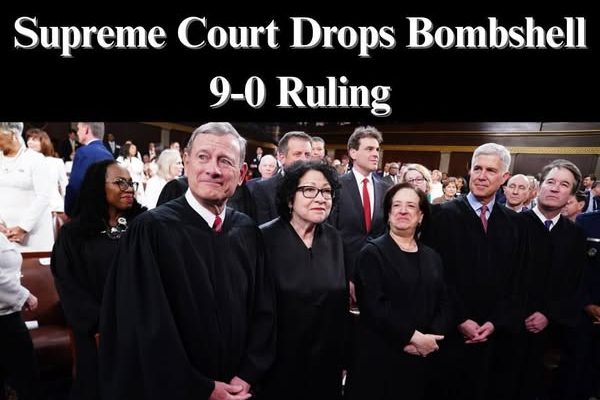
The U.S. Supreme Court ruled unanimously on Thursday in favor of an Ohio woman who claimed she was unfairly denied employment advancements in favor of lesbian candidates.
The decision, Ames v. Ohio Department of Youth Services, holds that members of majority groups in protected classes do not need to demonstrate a higher level of proof to prove discrimination.
Justice Ketanji Brown Jackson, who was appointed by former President Joe Biden, penned the court’s opinion in the 9-0 judgment.
“The Sixth Circuit has implemented a rule that requires certain Title VII plaintiffs—those who are members of majority groups—to satisfy a heightened evidentiary standard,” Jackson wrote. “We conclude that Title VII does not impose such a heightened standard on majority group plaintiffs. Therefore, the judgment below is vacated.”
Marlean Ames, the woman in the case, is straight and has worked for the Ohio Department of Youth Services since 2004.
She claimed she was discriminated against because of her sexual orientation after being passed up for a promotion in 2019 in favor of a lesbian woman and then being replaced in her own job by a homosexual man.
“Ames was qualified, had been denied a promotion in favor of a gay candidate, and was later demoted in favor of another gay candidate—evidence that would ordinarily satisfy her prima facie burden—before it specifically faulted Ames for failing to make the ‘requisite showing of “background circumstances.”‘”
Employers are prohibited under Title VII from discriminating against employees based on their race, color, religion, gender, or national origin. Thursday’s decision overturns the Sixth Circuit Court’s “background circumstances” rule, which requires majority parties in protected classifications to provide further proof of discrimination.
The ruling issued on Thursday does not, however, totally decide the lawsuit in Ames’ favor.
The court points out that Ohio had “alternative arguments” for why the state government’s treatment of Ames was reasonable. The judges stated that they are not weighing in on those alternative arguments, but rather striking down the “background circumstances” criterion.
“We granted review to consider the validity of the ‘background circumstances’ rule, and we reject that rule for the reasons set forth above. We leave it to the courts below to address any of Ohio’s remaining arguments on remand,” Jackson wrote.
The nation’s highest court has been busy this week.
The Supreme Court ruled on Thursday in favor of a Wisconsin-based Catholic charity group in a case involving unemployment tax credits for religious institutions, handing faith-based organizations a victory after they argued the state’s decision violated the religious clauses of the First Amendment.
The high court’s justices unanimously agreed that the state had engaged in an “unnecessary entanglement” in seeking to determine whether religious groups could be eligible for an otherwise accessible tax exemption based on the state’s religious conduct requirements, Fox News noted.
“When the government distinguishes among religions based on theological differences in their provision of services, it imposes a denominational preference that must satisfy the highest level of judicial scrutiny,” Justice Sonia Sotomayor said, writing for the majority.
“Because Wisconsin has transgressed that principle without the tailoring necessary to survive such scrutiny, the judgment of the Wisconsin Supreme Court is reversed, and the case is remanded for further proceedings not inconsistent with this opinion,” Sotomayor added.
The Wisconsin Supreme Court had previously ruled that the Catholic Charities group in question was not “operated primarily for religious purposes,” since it serve and employs non-Catholics, and does not “attempt to imbue program participants with the Catholic faith.”
The nation’s highest court made headlines recently by giving the Trump administration a big win.
The Supreme Court last Friday allowed Trump’s administration to remove the temporary legal status of hundreds of thousands of Venezuelan, Cuban, Haitian, and Nicaraguan migrants living in the United States, supporting the Republican president’s push to increase deportations.
The court stayed Boston-based U.S. District Judge Indira Talwani’s order halting the administration’s move to end the immigration “parole” granted to 532,000 of these migrants by former President Joe Biden, potentially exposing many of them to immediate removal, while the case is heard in lower courts.
Immigration parole is a type of temporary authorization granted by American law to enter the nation for “urgent humanitarian reasons or significant public benefit,” which allows grantees to live and work in the United States. Biden, a Democrat, used parole as part of his administration’s strategy for deterring illegal immigration along the U.S.-Mexico border.
Trump issued an executive order on January 20, his first day back in office, calling for the elimination of humanitarian parole programs. The Department of Homeland Security then attempted to terminate them in March, shortening the two-year parole awards.
On May 19, the Supreme Court also allowed Trump to withdraw a deportation protection known as temporary protected status, which Biden had granted to some 350,000 Venezuelans living in the United States while the legal battle was being resolved.



